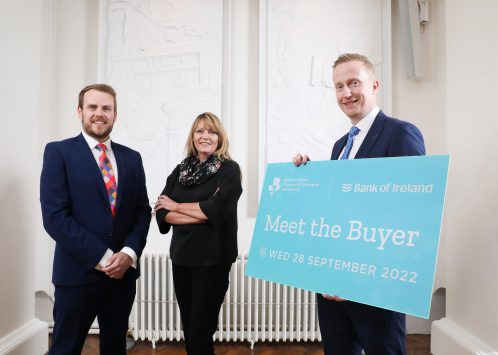Gillian McAuley, Vice-President, Northern Ireland Chamber of Commerce and Industry
Next week, voters across Northern Ireland will head to the polls in what is likely to be the most important election in a generation for business, and society as a whole.
Right now, companies are being tested like never before. Their resilience is being pushed by a myriad of challenges from soaring costs, labour and skills shortages, to supply chain issues and of course, protracted uncertainty around the Northern Ireland Protocol.
Such a challenging environment requires a functioning Executive. It is an uncomfortable truth that in the past five years, we’ve seen the Executive collapse twice, stalling growth, delaying reform and ultimately damaging our reputation as a place to invest. This cycle needs to stop. We need a stable Executive that sees through a full mandate and delivers on the issues that matter.
From tackling the skills crisis to driving a low carbon transition, the next Executive cannot afford to allow divisions on the Northern Ireland Protocol to hold back our economic recovery.
For many of our exporters, the Protocol has operated effectively. Some believe it has even delivered a competitive advantage, and that should be harnessed. The sticking point remains GB to NI movements, where there has been a frustrating lack of progress. A significant proportion of goods coming from GB are of course destined for final sale to consumers. According to the latest data from Asda’s Income Tracker, the average Northern Ireland household is rooted at the bottom of the UK league table in terms of weekly spending power, underlining the urgent need to find a way forward to protect us all from ever rising costs.
At present, the UK government’s standstill period continues to support the flow of goods from GB. But it must do more to build the trust needed for a sustainable outcome. For its part, the EU has come a considerable distance in the last 12 months. Yet, it must go further and it must move faster.
For the best possible long-term outcome we need to see trust, co-operation and flexibility from both sides, not unilateral action.
As speculation rises as to what happens next, it should not be forgotten that the local business community remains the only trusted actor in the process. Survey after survey shows that the voter trusts business to find a way through the technical challenges. But if we want the EU and UK to sit up and listen, the onus is on our local parties to reach consensus in support of the business community.
One of the top asks of the Northern Ireland Business Brexit Working Group (a collaboration of 14 local industry bodies) is to see a durable solution for the movement of food, plants and animals in particular. The EU’s proposals from October last year were a constructive starting point but they fell short of tackling the cumulative burden of labelling, paperwork and other regulatory demands. A landing zone is however possible by bringing together a workable trusted trader scheme with a bespoke agreement on standards.
For all businesses purchasing goods from Great Britain, a radical reduction in customs bureaucracy is a must, particularly for our SMEs who lack the scale and resources to absorb additional time and costs. A final solution also needs to be a dynamic one that can evolve and flex over time. That will require a meaningful voice in the governance structures relating to laws and policies impacting trade here, and formal review mechanisms, including economic impact assessments on any regulatory challenges and consideration of mitigations or compensations needed to support NI trade flows.
To see that happen, we need our political parties to seize this chance to stand together with business. It is an ambitious ask but a united political voice is one that UK and EU negotiators should find difficult to ignore.
If we can start there, perhaps we can finally move from crisis to opportunity. Barrier free trade into two of the world’s most significant markets offers Northern Ireland an unrivalled USP. That should be grasped by both hands.


